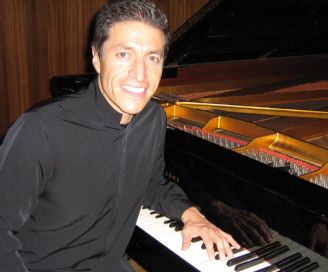|
Symphony
FROM THE NEW WORLD TO THE OLD WORLD
by Peter Lert
Saturday, June 14, 2025
Chamber
MC2 DUO RECITAL CLOSES 222'S SEASON
by Terry McNeill
Saturday, June 14, 2025
Choral and Vocal
CANTIAMO SONOMA'S LUSCIOUS A CAPELLA SINGING IN SEASON ENDING CONCERT
by Pamela Hicks Gailey
Sunday, June 8, 2025
Symphony
SRS SEASON ENDS WITH RESOUNDING TA-TA-TA-BANG
by Terry McNeill
Sunday, June 1, 2025
Symphony
YOUTHFUL VIRTUOSITY ON DISPLAY AT USO'S MAY CONCERTS
by Peter Lert
Saturday, May 17, 2025
Symphony
MYSTICAL PLANETS AND LIVELY GERSHWIN ORTIZ AT FINAL SRS CONCERT
by Peter Lert
Sunday, May 4, 2025
Symphony
VSO'S CONCERT MUSIC OF TIME, MUSIC OF PLACE
by Peter Lert
Sunday, April 27, 2025
VOCAL ELEGANCE AND FIRE AT THE 222'S RECITAL APRIL 26
by Pamela Hicks Gailey
Saturday, April 26, 2025
CANTIAMO SONOMA SINGS AN INSPIRED GOOD FRIDAY MOZART REQUIEM CONCERT
by Pamela Hicks Gailey
Friday, April 18, 2025
DRAMATIC SHOSTAKOVICH SYMPHONY CLOSES PHILHARMONIC'S 25TH SEASON
by Terry McNeill
Sunday, April 13, 2025
|
 |
 Gustavo Romero at the Newman Hall Piano Feb. 19 |
ROMERO CELEBRATES CHOPIN IN SANTA ROSA CONCERTS
by Terry McNeill
Friday, February 19, 2010
Recitals entirely devoted to the works of Chopin are not rare, and the 200th anniversary of the great Poleís birth has already spawned world-wide concerts of his music and for memorializing his artistry. What was basically new in pianist Gustavo Romeroís Oakmont (Feb. 18) and SRJC (Feb. 19) recitals was how he structured the program. The four tumultuous Ballades (Ops. 23, 39, 47 and 52) didnít constitute the second half, and the Ballades were not played in the usual order. Though the two recitals had different instruments, room acoustics and audience ambiance, the pianistís approach to the music and printed program were the same, and thus a composite review of the performances.
A singular pianist, Mr. Romero took a small-scaled approach to much of the music, eschewing hall-filling volume in favor of introspection, careful phrasing and fastidiously balanced chords. He seems to shy away from overstatement, even in the demanding passages of the G Minor and F Minor Ballades, leading the listener to appreciate previously overlooked parts of this wonderfully familiar and descriptive music. Beginning with the somber Prelude in C-Sharp Minor, Op. 45, Mr. Romero played with subtle tempos changes and just the right amount of rumination. The following B Major Nocturne, Op. 62, No. 1, was also performed in moderate tempo with expressive long trills and a deft distinction between the upper and lower voices.
Less intimate and more expansive than the Nocturnes, the F-Sharp Barcarolle, Op. 60, found Mr. Romero stressing the Italianate character of the melody and the arabesque-like contours. In the Op. 44 Polonaise, also in F Sharp, the pianist opted for clarity over momentum but captured the rhythmic drive of the work. The last chord was broken, to fine effect. Concluding the first half was the popular second Scherzo in B Flat, Op. 31. The many quiet sections and diminuendos were effective, as was the accelerando at the end. Less efficacious were the extended delays between sections and when Mr. Romero resorted to pounding before the coda, resulting in a shrill sound. In Berger Auditoriumís wide space the volume was pleasant, but in Newman it was harsh and overly loud.
Changing the usual order of the Ballades, by opus number, made sense in Mr. Romeroís capable hands. The cheery A-Flat Major had the requisite careful pedaling and phrasing in the second subject in F. In the second Ballade the opening folk-like material was handled adroitly but was in small profile, even during the outbursts of sound (presto con fuoco) at bars 47 and 169. The big chord at measure 197, lapsing immediately to unisons in piano, was held with a long pedal, producing a shimmering effect.
The final two Ballades, in F Minor and G Minor, are great dramas that unfold through Chopinís genius, and Mr. Romero applied effective rubato throughout. In Op. 52, the left-hand octaves were robustly played, and the fortissimo chord at 202, with the bottom octave in C, was cut off without pedal, producing some anxious clapping from a few in the Newman Auditorium audience. The tumultuous coda went well. The G Minor Ballade was played with less pedal, everything scrupulously planned but without many of the romantic-era flourishes that makes a much-admired work seem fresh. The right-hand octaves in bars 110 to 111 were performed fast, without vocal phrasing so needed in Chopin.
The single encore, Turkish composer Fazil Sayís ďBlack Earth," was a sensation. The 1997 composition has slowly arpeggiated chords, mostly in the left hand, combining with intriguing sounds from piano strings muted by the artistís left (and occasionally) right hand. The result, in just over seven minutes, was a haunting tour de force of sonority from Mr. Romero. The audience and the reviewer were captivated.
|

